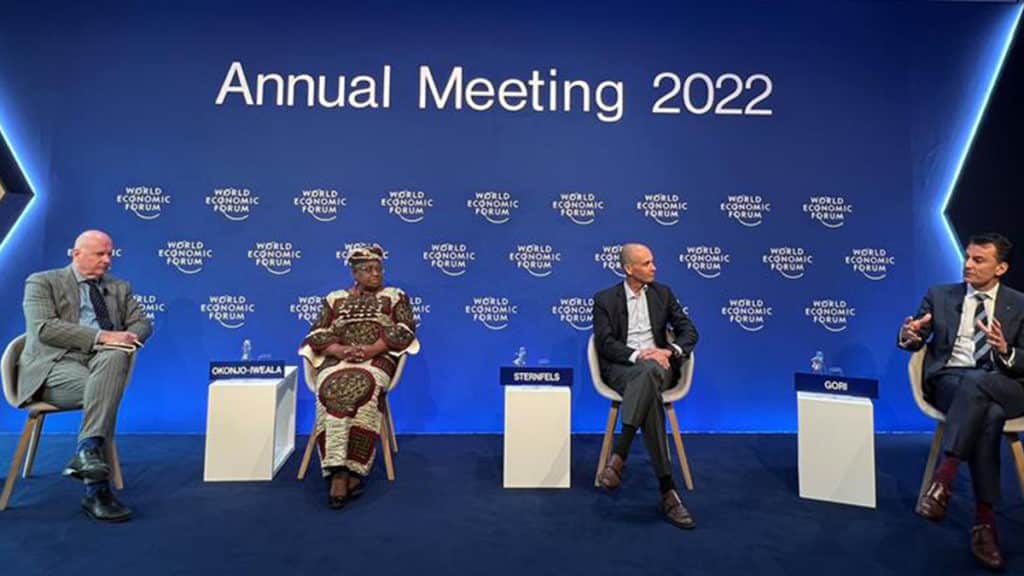Davos: La DG Okonjo-Iweala apela a la solidaridad mundial para responder a las crisis

En el Foro Económico Mundial de Davos, la Directora General Ngozi Okonjo-Iweala instó a los dirigentes de los Gobiernos y del sector empresarial a trabajar de consuno a través de instituciones multilaterales como la OMC para abordar las múltiples crisis a las que se enfrentan la economía y el comercio mundiales.
(de momento sólo en inglés)
In a gathering overshadowed by the Ukraine conflict and its impact on global food supplies, the Director-General met with heads of state, prime ministers, senior officials, corporate heads, academics, journalists and others during her Davos stay, which wrapped up on 26 May.
The DG also met with trade ministers in attendance on 25 May to brief them on preparations for the organization’s 12th Ministerial Conference (MC12) on 12-15 June and to review progress in the negotiations on several key issues to be addressed at MC12.
In her interventions, the DG underlined the important role that the WTO can play in helping to tackle pressing issues such as growing food insecurity, the COVID-19 pandemic, climate change, supply chain disruptions and dwindling fisheries resources.
At a Forum session focusing on financing resilient economies, the DG said that a theme common to all the major crises facing the world today is that of the global commons, and the fact that no single country can resolve these challenges on its own.
«You cannot have resilience unless you have global solidarity,» she told the Forum participants. «It’s survival together, it’s supporting each other, it’s financing together, it’s recognizing that my resilience cannot happen unless your resilience also happens.»
The DG reminded participants that world leaders created a set of institutions after the Second World War based on the idea of solidifying international interdependence and solidarity and using these institutions to help solve problems of the global commons.
«We have the institutions, we just have not reformed them to be able to deal with these issues, and my institution, the WTO, is one that I think needs to be made fit for purpose,» she declared.
The Director-General also participated in a discussion on challenges to trade with European Union Trade Commissioner Valdis Dombrovskis and Indian Commerce Minister Piyush Goyal.
During this discussion, the DG noted that at MC12, WTO members will be addressing many crisis issues. These will include the WTO’s response to the pandemic, both in terms of addressing trade and health measures, and of a waiver to WTO intellectual property rules for vaccine production; concluding more than two decades of negotiations on an agreement to eliminate harmful fisheries subsidies; setting the path for future work on agricultural reform; and launching the process for discussions on WTO reform.
Members will also seek to address food security fears by looking at what steps can be taken to facilitate trade’s central role in ensuring that food is available to those in need, while also addressing the concerns of producers regarding the need to ensure sufficient domestic supply.
«It’s very difficult to agree to things multilaterally, and that has been plaguing the WTO,» she acknowledged. «We shouldn’t make light of it. That’s why we need to find ways forward to agree on some things to show that the organisation can function.»
The DG also underlined the urgent need to address global warming and its impacts during a Forum discussion on climate change. She said that climate change should not be sidelined as the world grapples with other immediate challenges.
«The consequences of inaction are in front of us every day, on every continent, in so many countries,» she said. «It’s true that we’re in a world of simultaneous crises, climate change, food, the pandemic, international security, but I don’t think we can prioritize one over the other because they’re all linked, they’re all crises of the global commons.»
An effective response, however, requires significant financial commitments, something many poorer countries lack as they grapple with food shortages and the pandemic.
«Developed countries had promised that, to tackle climate change, there would be US$ 100 billion per year to help poor countries meet their costs. That hasn’t been done,» she said in reference to the commitment made at the 2009 United Nations climate summit in Copenhagen.» There are no excuses on this.»
The DG reiterated her call for a global carbon pricing mechanism involving developing countries to assuage fears of «green protectionism» and said the WTO would be the proper forum for such discussions given its broad and diverse membership. The WTO is already collaborating with the International Monetary Fund, the World Bank and the Organisation for Economic Co-operation and Development to explore such an initiative, she noted.
















